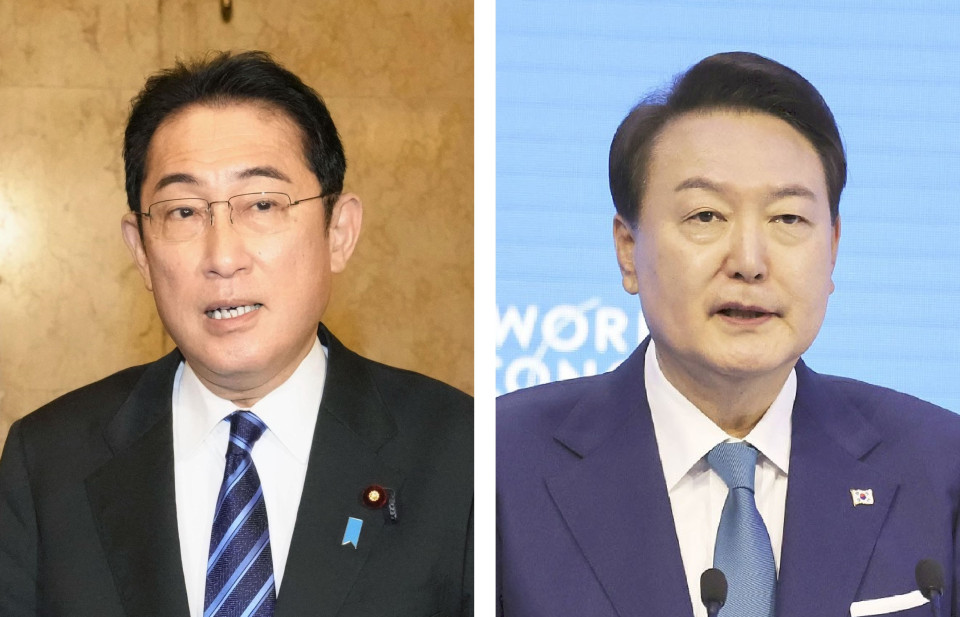South Korean President Yoon Suk Yeol is scheduled to visit Japan next Thursday for talks with Prime Minister Fumio Kishida, the two governments said, with efforts by Seoul to resolve a major dispute with Tokyo pointing to signs of a thaw in frosty bilateral relations.
Yoon's two-day visit to Japan with his wife Kim Keon Hee comes after South Korea on Monday announced its plan for settling a wartime labor compensation issue with Tokyo.
Chief Cabinet Secretary Hirokazu Matsuno said at a press conference Thursday that South Korea is Japan's "important partner working together to respond to various challenges in the international community."
Matsuno, the top government spokesman, said Yoon's trip to Japan will likely further develop bilateral ties.

Later Thursday, Kishida told reporters that Japan "appreciates" South Korea's announcement of its solution to the wartime labor row, adding he is taking Yoon's visit as a chance to "bolster bilateral relations."
In Seoul, the South Korean presidential office said Yoon's trip would mark the resumption of reciprocal visits between the leaders of the two nations, which have been suspended for 12 years, calling the travel an "important milestone" toward improving bilateral ties.
South Korea hopes that the two Asian countries will expand security and economic cooperation while boosting people-to-people exchanges "in order to overcome the unfortunate history of the past and move forward into the future," the office said.
Under the plan, a South Korean government-backed foundation will pay compensation to Korean plaintiffs who won lawsuits over alleged forced labor during Japan's 1910-1945 colonial rule of the Korean Peninsula instead of the Japanese companies that were sued.
Kishida hailed the decision by South Korea, saying it will help restore "healthy" relations between Tokyo and Seoul, which frayed under the previous administration of President Moon Jae In.
Bilateral ties plunged to the lowest point in decades after South Korea's top court in 2018 ordered two Japanese companies -- Mitsubishi Heavy Industries Ltd. and Nippon Steel Corp. -- to compensate the plaintiffs.
Yoon, however, has been trying to improve relations with Japan since taking office last year while strengthening military cooperation with the United States amid growing security threats from North Korea.
Meanwhile, Japan is considering inviting Yoon as a guest to the Group of Seven summit, slated to be held in May in Hiroshima, diplomatic sources said.
Kishida, who became prime minister in October 2021, is expected to make a final judgment on whether to sound Yoon out on taking part in the summit in his home constituency after meeting with the president in Japan next week, the sources said.
During the conversation with Yoon, Kishida will seek to gauge whether South Korea implements the solution to the wartime labor spat in a steady manner before formally deciding to allow Yoon to join the G-7 summit, the sources said.
South Korea has expressed willingness to arrange Yoon's participation in the summit, they added.
If Yoon attends the G-7 gathering, Kishida will seek an opportunity to hold trilateral talks, including U.S. President Joe Biden, to deepen their coordination to deal with North Korea's missile and nuclear development programs, according to the sources.
As the holder of this year's G-7 presidency, Japan can decide which nations to invite to the three-day summit from May 19 as "outreach" countries.
So far, Japan has been eager to extend an invitation to Australia, a U.S. security ally, as well as India and Indonesia, the chairs of the Group of 20 economies and the Association of Southeast Asian Nations in 2023, respectively, the sources said.
The G-7 groups Britain, Canada, France, Germany, Italy, Japan and the United States, plus the European Union.
The last time a South Korean president made a trip to Japan was in June 2019, for the G-20 summit in Osaka. Reciprocal visits between the leaders of the two countries have been suspended since December 2011.
Related coverage:
Japan, South Korea move to solve wartime labor dispute, other concerns
Japan, South Korea to work to normalize chip-making material trade
FOCUS: Japan-S. Korea wartime labor row still far from fundamental solution










